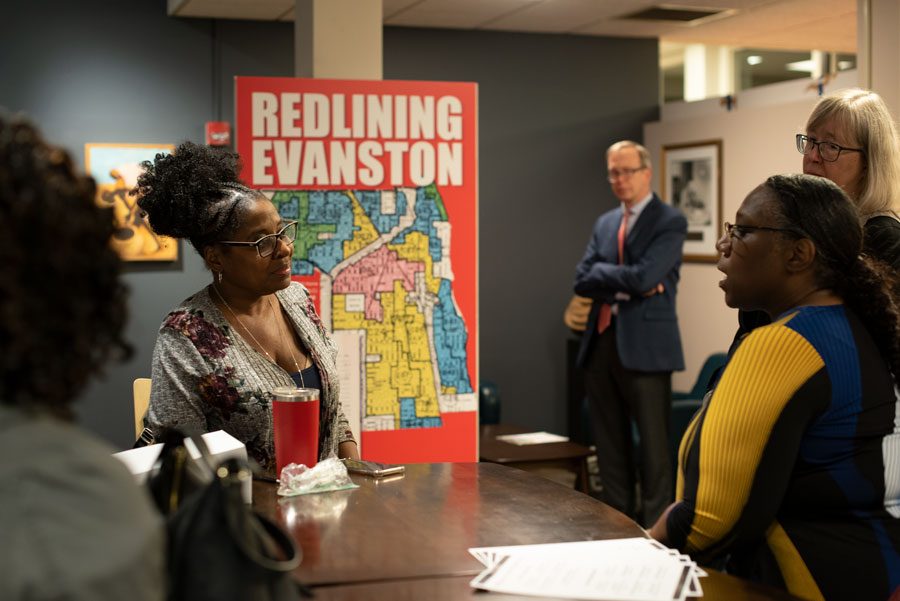‘Undesign the Redline’ exhibit brings discussion series on equity to Evanston
Evan Robinson-Johnson/Daily Senior Staffer
Evanston residents gather to discuss redlining at the Lorraine H. Morton Civic Center. The event was the first in a series the city is holding.
October 8, 2019
Evanston community members engaged in an open discussion about redlining, racial discrimination and positive change Tuesday night at the Lorraine H. Morton Civic Center.
The event was the first in a series hosted in conjunction with the “Undesign the Redline” exhibit on display at the Civic Center. Designing the We, a design studio with a focus on social activism, created the exhibition, which travels across the nation. The exhibition details the history of redlining — a form of systematic discrimination through which racial minorities were refused loans for housing in the 1930s. Redlining has had lasting implications into the present.
As visitors walk through the exhibit, they can read stories about the creation and enforcement of redlining by both governments and communities. Historical documents detail how the issue was dealt with over the past 90 years, while interchangeable maps and graphs can be customized to focus on the current location of the exhibit.
The Evanston Equity and Empowerment commission sponsored the exhibit in May. In addition to the displays, a local designer also created a panel about how Evanston has been affected by redlining, which will be a permanent fixture in the Civic Center.
The city partnered with Evanston Cradle to Career’s Advocates for Action to hold the Tuesday event in hopes of bringing conversations about equity and empowerment to the forefront of the community’s mind. EC2C is an organization that trains leaders in the community and strives to create systemic improvements throughout Evanston.
Northwestern Prof. Stephen Carr, an Evanston resident of 50 years, lived through the civil rights movement and said he has witnessed many periods of transition through the country’s history. He said the exhibit highlighted trends he’d observed throughout his life.
“This shows the underlying codification of it all,” Carr said. “There were laws against segregation, but they were allowed to evaporate.”
Patricia Efiom, Evanston’s chief equity officer, said the discussions she has had so far indicate a genuine interest from some Evanston residents to gain a greater understanding of the issue.
Efiom said she hopes the exhibit and event series can start to encourage systematic change within the city, which last month approved recommendations to explore reparations for black residents but still struggles with housing discrimination, as well as the wealth and opportunity gaps.
“Our goal is to begin the real work of dismantling racism,” Efiom said. “There’s no simple answer to that. But these should be a series of conversations and engagements, in which we have to recognize barriers that all of us face, black or white, to ending racism.”
As the first partner in the discussion series, EC2C hoped to share about how it creates positive change in the community. According to Kimberly Holmes-Ross, EC2C’s community engagement manager, one of the ways the organization goes about making change is through a series of grants, ranging from $250 to $1000, given to leaders in the community that may not have received funding anywhere else.
Holmes-Ross said that the group also partners with over 40 organizations in the area to improve the quality of life for all Evanston youth. She said the group’s focus on enhancing opportunities aligned well with the intent of the exhibit, and that a partnership seemed natural.
“These exhibits and discussions are a step,” Holmes-Ross said. “We’re moving into action. And part of what we do is to give community building grants. Giving the grants to individuals and groups is a way to not only empower them but empower their communities.”
Email: [email protected]
Twitter: @jacobnfulton1
Related Stories:
–Equity and Empowerment Commission discusses racial disparity and reparations
-Equity and Empowerment Commission works toward reconciliation, reparations through interactive redlining exhibit
-Dear Evanston organizes trip to engage with the history of slavery


